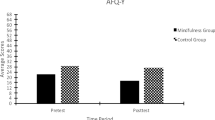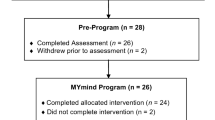Abstract
The purposes of this study were a) to provide data on caregivers' preexisting knowledge of temperament concepts, and b) to investigate the effect of training sessions for caregivers about temperament concepts. Two hundred ninety-two caregivers of children 6 years and under completed questionnaires measuring their knowledge of temperament and acceptance of children. In addition, a randomized, pre-test-posttest-delayed posttest, control group design was used to assess the effect of temperament workshops on the knowledge of 169 of the caregivers. The major findings were: 1. Without training, caregivers knew what temperament was but had limited knowledge about many specific concepts concerning temperament, 2. without training, caregivers demonstrated little knowledge about how to achieve a goodness of fit by using behavioral management techniques; though they did particularly want to know more about this concept; 3. the caregivers showed a high degree of acceptance of temperament concepts; 4. training sessions were effective in increasing the caregivers' knowledge about temperament concepts; however, 5. there was no statistically significant indication that the training sessions were effective in increasing the caregivers' acceptance of children's behaviors and feelings.
Similar content being viewed by others
References
Bates, J.E. (1989a). Concepts and measures of temperament. In G.A. Kohnstamm, J.E. Bates, & M.K. Rothbart (Eds.), Temperament in childhood (pp. 3–26). New York: John Wiley.
Bates, J.E. (1989b). Applications of temperament concepts. In G.A. Kohnstamm, J.E. Bates, & M.K. Rothbart (Eds.), Temperament in childhood (pp. 321–355). New York: John Wiley.
Bredekamp, S., & Copple, C. (Eds.) (1997). Developmentally appropriate practice in early childhood programs (Rev. ed.). Washington, DC: NAEYC.
Carey, W.B. (1990). Temperament risk factors in children: A conference report. Developmental and Behavioral Pediatrics, 11, 28–34.
Carey, W.B., & McDevitt, S.C. (1995). Coping with children's temperament. New York: Basic Books.
Caruso, J., & Fawcett, M. (1986). Supervision in early childhood education. New York: Teachers College Press.
Chess, S. (1990). Temperaments of infants and toddlers. In R. Lally (Ed.), A guide to social-emotional growth and socialization (pp. 4–13). Sacaramento, CA: California Department of Education.
Chess, S., & Thomas, A. (1996). Temperament: Theory and practice. New York: Brunner/Mazel.
Cook, T.D., & Campbell, D.T. (1979). Quasi-Experimentation. Boston: Houghton Mifflin.
Cost, Quality & Child Outcomes Study Team (1995). Cost, quality and child outcomes in child care centers, public report. Denver: Economics Department, University of Colorado at Denver.
Far West Laboratory (1993). Module I: Social-emotional growth and socialization. Sacramento, CA: California Department of Education.
Fosburg, S. (1981). Family day care in the United States: National Day Care Home Study: Vol. I. Summary of findings. Office of Human Development Services. DHHS Publication No. (OHDS) 80–30282. Washington, DC: U.S. Department of Health and Human Services.
Franyo, G. (1996). Temperament: Recognizing, respecting, and responding. Unpublished doctoral candidacy project, University of Delaware at Newark.
Galinsky, E., Howes, C., Kontos, S., & Shinn, M. (1994). The study of children in family child care and relative care: Highlights of findings. New York: Families and Work Institute.
Goldsmith, H.H., Buss, A.H., Plomin, R., Rothbart, M.K., Thomas, A., Chess, S., Hinde, R.H., & McCall, R. (1987). Roundtable: What is temperament? Four approaches. Child Development, 58, 505–529.
Hampson, R.B., Schulte, M.A., & Ricks, C.C. (1983). Individual versus group training for foster parents: Efficiency/effectiveness evaluations. Family Relations, 32, 191–201.
Hayes, C.C., Palmer, J.L., & Zaslow, M.J. (Eds.) (1990). Who cares for America's children? Washington, DC: National Academy Press.
Hereford, C.F. (1963). Changing parental attitudes through group discussion. Austin: University of Texas Press.
Hernandez, D.J. (1993). America's children. New York: Russell Sage Foundation.
Hofferth, S., Brayfield, A., Deich, S., & Holcomb, P. (1991). National Child Care Survey, 1990. Washington, DC: Urban Institute Press.
Hyson, M.C., & Lee, K.L. (1996). Assessing early childhood teachers' beliefs about emotions: Content, contexts, and implications for practice. Early Education and Development, 7(1), 59–78.
Jackman, H.L. (1997). Early education curriculum. Albany, NY: Delmar.
Johnson, R. (1991). Making a friendly diagnosis. Journal of Psychology and Christianity, 10(1), 66–71.
Kagan, J. (1994). Galen's prophecy. New York: Basic Books.
Kagan, J. (1998). Biology and the child. In W. Damon (Series Ed.), N. Eisenberg (Vol. Ed.), Handbook of child psychology: Vol. 3. Social, emotional, and personality development (5th ed., pp. 177–235). New York: John Wiley.
Kirkpatrick, D.L. (1967). Evaluation of training. In R.L. Craig & L.R. Bittel (Eds.), Training and development handbook (pp. 87–112). New York: McGraw-Hill.
Kirkpatrick, D.L. (1994). Evaluating training programs. San Francisco: Berrett Koehler.
Kurcinka, M.S. (1991). Raising your spirited child. New York: HarperCollins.
Morgan, G., Azer, S., Costley, J., Elliott, K., Genser, A., Goodman, I., & McGimsey, B. (1994). In J. Johnson & J. McCracken (Eds.), The early childhood career lattice (pp. 133–139). Washington, DC: NAEYC.
Morrison, G.S. (1998). Early childhood education today (7th ed.). Upper Saddle River, NJ: Prentice-Hall.
Neville, H., & Johnson, D.C. (1998). Temperament tools. Seattle: Parenting Press.
Olson, D.H. (1977). Insiders' and outsiders' views of relationships: Research studies. In B. Levinger & H.L. Raush (Eds.), Close relationships: Perspectives on the meaning of intimacy (pp. 115–135). Amherst: University of Massachusetts Press.
Roosa, M.W., & Vaughan, L. (1984). A comparison of teenage and older mothers with preschool age children. Family Relations, 33, 259–265.
Rothbart, M.K., & Bates, J.E. (1998). Temperament. In W. Damon (Series Ed.), & N. Eisenberg (Vol. Ed.), Handbook of child psychology: Vol. 3. Social, emotional, and personality development (5th ed., pp. 105–176). New York: John Wiley.
Seefeldt, C., & Barbour, N. (1998). Early childhood education (4th ed.). Upper Saddle River, NJ: Prentice-Hall.
Sparks, G. (1987). Promoting the professional development of teachers in career ladders. Oxford, OH: National Staff Development Council.
Summerlin, M.L., & Ward, G.R. (1978). The effect of parental participation in a parent group on a child's self-concept. Journal of Psychology, 100, 227–332.
Thomas, A., Chess, S., & Birch, H. (1968). Temperament and behavior disorders in children. New York: New York University Press.
Travers, J., Goodson, B.D., Singer, J.D., & Connell, D.B. (1979). Final report of the National Day Care Study: Research Results of the National Day Care Study. Cambridge, MA: Abt Associates.
Whitebook, M., Howes, C., & Phillips, D. (1989). The national child care staffing study: Who cares? Child care teachers and the quality of care in America. Oakland, CA: The Child Care Employee Project.
Zigler, E., & Hall, N. (1994). Seeing the child in child care: Day care, individual differences, and social policy. In W.B. Carey & S.C. McDevitt (Eds.), Prevention and early intervention (pp. 237–245), New York: Brunner/Mazel.
Author information
Authors and Affiliations
Rights and permissions
About this article
Cite this article
Franyo, G.A., Hyson, M.C. Temperament Training for Early Childhood Caregivers: A Study of the Effectiveness of Training. Child & Youth Care Forum 28, 329–349 (1999). https://doi.org/10.1023/A:1021922413145
Issue Date:
DOI: https://doi.org/10.1023/A:1021922413145




